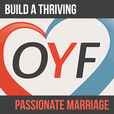
Summary: So, what if your parents didn’t have a great marriage? Or, maybe other folks who served as role models in your life haven’t modeled a healthy, thriving marriage? Are you hooped, or is there hope? Let’s figure out if there’s any hope.<br> <br> If you are in this situation of having poor role models, you are not alone. This is such a common, shared experience. We all try to do our best as a couple, but even then, I’m sure our kids can see things that they like and will adopt from our relationship, but also see other things they’re not going to want to carry forward.<br> We all face this challenge of role models, to varying degrees, so be encouraged!<br> The first thing we need to remember is that all role models are useful. We all think the positive ones are, but negative ones can be as well. What the research shows about human behavior is that when we want to add positive, beneficial activities to our lives we look for positive role models. For example, if I want to work out more often, I will choose a fit person as a role model.<br> On the other hand, when we want to remove unhelpful behaviors, such as over-eating, we may consider a very obese person as a role model. That is an example of a useful negative role model.<a href="#_edn1" name="_ednref1">[i]</a><br> We use positive role models to help us engage in beneficial activities and negative role models to sustain our motivation to refrain from negative activities. So, no matter what role models you had, they all are useful either as something you want to imitate or avoid.<br> Another challenge when thinking about our role models is to remember that role models are very rarely ALL bad or ALL good. We want to be selective and wise and put things in the right buckets. It’s really about taking the good and leaving the bad, or as Caleb says, eating the meat and spitting out the bones!<br> There is an interesting cultural difference too when it comes to role models. European descendants are far more inspired and motivated by positive role models who highlight a strategy of pursuing success. More collectivistic cultures however, such as Asian-American, are more motivated by negative role models with a strategy to avoid failure.<br> Your cultural background is going to influence how much value or importance you place on each type of role model.<a href="#_edn2" name="_ednref2">[ii]</a><br> Let’s take a moment to look at root causes. How do our early role models affect our ability to relate today?<br> Caleb values attachment theory when looking at early childhood role models. “The basic tenet of attachment theory is that the accessibility and responsiveness of a trusted other leads to greater social and emotional adjustment at any age.”<a href="#_edn3" name="_ednref3">[iii]</a><br> This is saying that our ability to relate to others is formed by our childhood caregivers. The kind of atmosphere our caregivers gave us for establishing relationships affects even how we relate to people today. If our caregivers did not provide a safe, secure environment, we may struggle in our relationships, as we grow older.<br> The good news is that attachment can improve in the context of a secure relationship. Be that trusted other for your spouse!<br> The first part in doing this is to create safety within your marriage. Make it a shared value to respect one another. Avoid name-calling, barbed comments, teasing sprinkled with sarcastic truth, and any forms of criticism or contempt. Agree to create a culture within your marriage where safety is a fundamental, inviolable principle.<br> So, even if you didn’t have good role models, make a covenant with your spouse that you are committed to making the marriage safe. This doesn’t mean the absence of conflict, it just means you’re committed to growing the sense of security and repairing breaches when they are made.<br> Abuse, of any kind, is so damaging to a marriage because the fundamental principles of an intimate emot...
